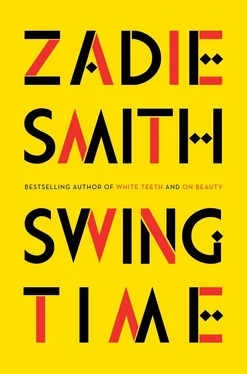Five
A Sunday in late summer. I was on the balcony, watching a few girls from our floor skipping Double Dutch down by the bins. I heard my mother calling me. I looked over and saw her entering the estate, hand in hand with Miss Isabel. I waved, and she looked up, smiled and shouted, “Stay there!” I had never seen my mother and Miss Isabel together outside of class, and could tell even from this vantage point that Miss Isabel was being hustled into something. I wanted to go and confer with my father, who was painting a wall in the living room, but I knew my mother, so charming with strangers, had a short temper with her kin, and that “Stay there!” meant exactly that. I watched this odd pair move through the estate and into the stairwell, refracted in the glass blocks as a scatter of yellow and pink and mahogany brown. Meanwhile the girls by the bins switched the direction of their skipping ropes, a new jumper ran bravely into the vicious swinging loop and began a new chant, the one about the monkey who got choked.
Finally my mother came upon me, examined me — she had a coy look on her face — and the first thing she said was: “Take your shoes off.”
“Oh, we needn’t do it right now,” murmured Miss Isabel, but my mother said, “Better to know now than later,” and disappeared into the flat, reappearing a minute later with a large bag of self-raising flour, which she began sprinkling all over the balcony until there was a thin white carpet like first snowfall. I was to walk through this barefoot. I thought of Tracey. I wondered if Miss Isabel visited each girl’s house in turn. What a terrible waste of flour! Miss Isabel crouched down to watch. My mother leaned back against the balcony with her elbows resting upon it, smoking a cigarette. She was at an angle to the balcony, and the cigarette was at an angle to her mouth, and she was wearing a beret, as if wearing a beret were the most natural thing in the world. She was positioned at an angle to me, an ironic angle. I reached the other end of the balcony and looked back at my footprints.
“Ah, well there you are,” said Miss Isabel, but where were we? In the land of flat feet. My teacher slipped off a shoe and pressed her foot down for comparison: in her print you saw only the toes, the ball of the foot and the heel, in mine, the full, flat outline of a human tread. My mother was very interested in this result, but Miss Isabel, seeing my face, said something kind: “A ballet dancer needs an arch, yes, but you can tap with flat feet, you know, of course you can.” I didn’t think it was true, but it was kind and I clung to it and kept taking the class, and so continued to spend time with Tracey, which was, it dawned on me later, exactly the thing my mother had been trying to stop. She’d worked out that because Tracey and I went to different schools, in different neighborhoods, it was only dance class that brought us together, but when the summer came and dance class stopped, it made no difference anyway, we grew closer until, by August, we found ourselves together almost every day. From my balcony I could see into her estate and vice versa, no phone calls had to be made, and no formal arrangements, and although our mothers barely nodded at each other in the street it became a natural thing for us to pass in and out of each other’s building.
Six
We had a different mode of being in each flat. In Tracey’s we played and tested new toys, of which there appeared to be an unending supply. The Argos catalog, from whose pages I was allowed to choose three inexpensive items at Christmas, and one item for my birthday, was, to Tracey, an everyday bible, she read it religiously, circling her choices, often while in my company, with a little red pen she kept for this purpose. Her bedroom was a revelation. It overturned everything I thought I had understood about our shared situation. Her bed was in the shape of a pink Barbie sports car, her curtains were frilled, all her cabinets were white and shiny, and in the middle of the room it looked like someone had simply emptied Santa’s sleigh on to the carpet. You had to wade through toys. Broken toys formed a kind of bedrock, on top of which each new wave of purchases was placed, in archeological layers, corresponding, more or less, to whatever toy adverts were playing on the television at the time. That summer was the summer of the pissing doll. You fed her water and she pissed everywhere. Tracey had several versions of this stunning technology, and was able to draw all kinds of drama from it. Sometimes she would beat the doll for pissing. Sometimes she would sit her, ashamed and naked, in the corner, her plastic legs twisted at right angles to her little, dimpled bum. We two played the poor, incontinent child’s parents, and in the dialog Tracey gave me to say I sometimes heard odd, discomfiting echoes of her own home life, or else of the many soaps she watched, I couldn’t be sure.
“Your turn. Say: ‘You slag — she ain’t even my kid! Is it my fault she pisses ’erself?’ Go on, your turn!”
“You slag — she’s not even my daughter! Is it my fault if she pisses herself?”
“‘Listen, mate, you take her! You take her and see how you do!’ Now say: ‘Fat chance, sunshine!’”
One Saturday, with great trepidation, I mentioned the existence of pissing dolls to my mother, being careful to say “wee” instead of “piss.” She was studying. She looked up from her books with a mixture of incredulity and disgust.
“Tracey has one?”
“Tracey has four .”
“Come here a minute.”
She opened her arms, and I felt my face against the skin of her chest, taut and warm, utterly vital, as if there were a second, graceful young woman inside my mother bursting to get out. She had been growing her hair, it had been recently “done,” plaited into a dramatic conch-shell shape at the back of her head, like a piece of sculpture.
“You know what I’m reading about right now?”
“No.”
“I’m reading about the sankofa. You know what that is?”
“No.”
“It’s a bird, it looks back over itself, like this.” She bent her beautiful head round as far as it could go. “From Africa. It looks backward, at the past, and it learns from what’s gone before. Some people never learn.”
My father was in the tiny galley kitchen, silently cooking — he was the chef in our home — and this conversation was really addressed to him, it was he who was meant to hear it. The two of them had begun arguing so much that I was often the only conduit through which information could pass, sometimes abusively—“You explain to your mother” or “You can tell your father from me”—and sometimes like this, with a delicate, an almost beautiful irony.
“Oh,” I said. I didn’t see the connection with pissing dolls. I knew my mother was in the process of becoming, or trying to become, “an intellectual,” because my father often threw this term at her as a form of insult during their arguments. But I did not really understand what this meant, other than that an intellectual was someone who studied with the Open University, liked to wear a beret, frequently used the phrase “the Angel of History,” sighed when the rest of their family wanted to watch Saturday-night telly and stopped to argue with the Trotskyites on the Kilburn High Road when everybody else crossed the road to avoid them. But the main consequence of her transformation, for me, was this new and puzzling indirection in her conversation. She always seemed to be making adult jokes just over my head, to amuse herself, or to annoy my father.
“When you’re with that girl,” explained my mother, “it’s a kind thing to play with her, but she’s been raised in a certain way, and the present is all she has. You’ve been raised in another way — don’t forget that. That silly dance class is her whole world. It’s not her fault — that’s how she’s been raised. But you’re clever. Doesn’t matter if you’ve got flat feet, doesn’t matter because you’re clever and you know where you came from and where you’re going.”
Читать дальше












